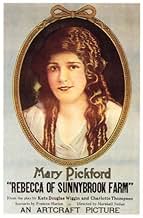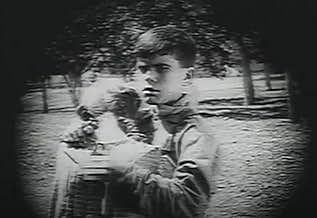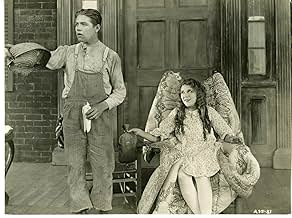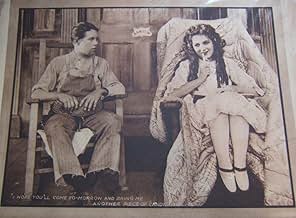Füge eine Handlung in deiner Sprache hinzuWith her family in financial difficulties, Rebecca is sent to live with her two strict, unfeeling aunts, who do not appreciate the young girl's charm and energy. Rebecca must make new friend... Alles lesenWith her family in financial difficulties, Rebecca is sent to live with her two strict, unfeeling aunts, who do not appreciate the young girl's charm and energy. Rebecca must make new friends and adjust to surroundings that are sometimes difficult. But she still finds time to thi... Alles lesenWith her family in financial difficulties, Rebecca is sent to live with her two strict, unfeeling aunts, who do not appreciate the young girl's charm and energy. Rebecca must make new friends and adjust to surroundings that are sometimes difficult. But she still finds time to think of numerous ways to help others in her new hometown.
- Regie
- Drehbuch
- Hauptbesetzung
- Mrs. Randall
- (as Jane Wolff)
- Mr. Simpson
- (as Frank Turner)
- Clara Belle Simpson
- (as Emma Gordes)
- School Boy
- (Nicht genannt)
- …
- Bit Part
- (Nicht genannt)
- Rebecca's Brother
- (Nicht genannt)
- Undetermined Role
- (Nicht genannt)
- Teenage Boy in Overalls
- (Nicht genannt)
Empfohlene Bewertungen
One should note a dubious instance of blackface that hasn't exactly aged well. Even by the standards of the silent era, there are also little details in the intertitles or scene writing that demonstrate values or culture that are all but totally alien to modern viewers. Smart, earnest, and entertaining as it is, mark this as an example of an older movie that may not appeal to those who aren't already enamored of works from the 1910s or 20s. This is to say nothing of aspects reflecting contemporary film-making sensibilities or capabilities (relatively exaggerated acting to compensate for lack of sound, sometimes brusque editing, division into discrete segments, and so on) that more commonly limit modern engagement. Yet though the sum total may not be altogether perfect, by and large I rather think this is splendid, and holds up better than some of its kin, or even no few flicks to follow the advent of talkies. That there are recognizable strains in the story is endearing, not off-putting, particularly as the good-natured levity of the proceedings readily shine through. Superseding the less favorable elements are themes of privilege, class, prejudice, plain old kindness, and stiff haughtiness, and the terrific contributions that everyone made to the picture.
Pickford stands out above all, yet her co-stars are no less able, and it's just a joy to watch the cast practice their art. Marjorie Daw, Eugene O'Brien, Violet Wilkey, Mayme Kelso, Josephine Crowell, and all others involved share in the tremendous spirit of warmth that broadly defines the film, making it all the more a delight. Moreover, crew behind the scenes did a fine job all around, from costume design, hair, and makeup, to sets, stunts, and simple effects. Modest by today's standards, there are nonetheless instances of cinematography or editing that are especially sharp on top of Neilan's swell direction. Really, even noting slight indelicacies or inelegance, in every way that matters most this is an excellent production. It may well represent "simpler entertainment for a simpler time," but there's gratifying sincerity and frivolity in the storytelling that handily outweighs whatever criticisms one might levy. Honestly, I quite had mixed expectations when I sat to watch, but I'm all so pleased at just how enjoyable and satisfying the end result is. While it may not be a feature that utterly demands viewership, when all is said and done 'Rebecca of Sunnybrook Farm' is softly compelling and rewarding, and in that unflagging wholeheartedness becomes something that's well worth one's time. Don't feel like you need to go out of your way for it, but at only 70 minutes, this is a pleasant, refreshing diversion.
We're presented with a series of comic episodes in the life of poor young girl Rebecca Rowena Randall, sent to live with her well-to-do aunts and get a proper ejjication. She goes from selling Superba Soap door to door, reciting her unique poetry for Visitors Day at school to organising a Circus Parade and Show and then going to boarding school. On the way she manages to help various people in trouble in her own understated way and also falls in love and fixes on the man to marry - after she becomes a woman. The most violent scene is when Rebecca pulls Minnie Smellie's nose in class. With some lovely evocative olde worlde touches, especially in the storm scene we are eventually (horse) drawn to an appropriate sunbeam ending.
Most people would disdain to clap their modern eyes on this, but that's their loss. A nice little film to sink into every few years and ruminate on how the world has changed.
Zukor believed in signing the top movie stars in the business. One of his first contracts was with Hollywood's most popular actress, Mary Pickford. Her signature on the dotted line on June 24, 1916, was the first million dollar pact for an female performer. Zukor was willing to pay her $10,000 a week and to give her half the profits for each film she made. He guaranteed over one million dollars (about $20 million in today's inflationary dollars) for the year with her full control of each of her film's production, an unprecedented contract at that time.
So impressed was Zukor with Frances Marion's script of "The Poor Little Rich Girl" he took the unusual step of paying her $50,000 per year to be Pickford's official scenarioist, making her one of the highest paid writers in the business. Marion wrote two other scripts for her in 1917, both becoming instant classics.
For her second Pickford screenplay, Marion took the 1903 Kate Wiggin's children novel, "Rebecca of Sunnybrook Farm" and the 1909 play of the same name and adapted it to fit Pickford's magnetic personality. The September 1917 movie contains a series of vignettes of Pickford playing a young niece who is harbored by two aunts, one cranky and the other laid back She's harped on because of her confident independence, except for a one loyal friend and a rich young man who has eyes out for the adolescent Rebecca. Innocent romance develops between the two in this feel-good motion picture which the members of the American Film Institute nominated as one of 500 films to be considered for its "Top 100 Funniest Movies."
The film begins with Rebecca (Pickford playing someone about age 14) going to live with her two elderly aunts. It seems that Rebecca's family is having financial problems and the aunts have offered to take one of the children in and adopt them--and the one turns out to be Rebecca. What follows is no real consistent theme--just a variety of incidents. Some involve Rebecca fighting with some stuck up girls at school, some with her attempts to help a local poor family and a very few involve Rebecca and her aunts. However, there really isn't much of a theme or purpose to all this. SOME attempt is made with the introduction of the Mr. Ladd character, but this is also very under-developed and a bit creepy. See the film and you'll understand about the whole 'creepy' angle. Overall, a film that left me surprisingly cold considering that I like Pickford's films...just not this one. Now I am not saying it's bad--just not nearly as good as her typical 'little girl' film.
By the way, if you want something other than these sorts of portrayals by Pickford, try finding a copy of "My Best Girl"-- probably her best film and one of the great silents.
Wusstest du schon
- WissenswertesThis was Milton Berle's first film.
- Zitate
Title Card: Aunt Miranda Sawyer, of Riverboro, has a Heart Which she Uses for no other Purpose Than the Pumping and Circulation of Blood.
- VerbindungenEdited into American Experience: Mary Pickford (2005)
Top-Auswahl
Details
- Laufzeit
- 1 Std. 18 Min.(78 min)
- Farbe
- Sound-Mix
- Seitenverhältnis
- 1.33 : 1



































